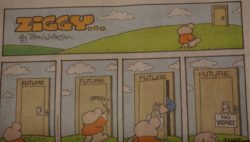
Everyone knows Ziggy, that bald round-faced guy from the newspaper comics often befuddled by the complexities of life. This week’s Ziggy comic jumped out at me, and asked students for their interpretations of it.
Ziggy encounters a door that says “Future” on it. So he rings the bell. A hand pops out from the behind the door and places a sign on the door handle. The sign reads: “No Vacancy”.
So what does that mean? What message is there in that there’s no vacancy in our future?
Initially, some students said it meant there was no hope for him. That he has no place in the future. It was a pessimistic interpretation at first. Then some said it is a sign that sometimes we may have to look elsewhere for our future, it is not always at the first door to the future that we find.
But then some students began to understand this as a message to live in the present. Don’t obsess with future, don’t hang out there. Our time is now! Be present in the present. Live in the moment. Don’t sit all day and worry about tomorrow, there’s no room for that. No vacancy.
Then some students started to say things like: we have to make our own future. That was a good one. No vacancy can be interpreted to mean there’s no empty slot sitting there and waiting for us, we have to create it, we have to make that happen. Like UAlbany’s new strategic slogan about being authors of our own destiny.
Tanya Chapter 36, in its Chassidic vision of Moshiach and the ultimate future, combines the last two thoughts of students: Living in the present and creating our own future. Tanya writes that all the spiritual revelation of the ultimate redemptions and days of Moshiach will be a result of our deeds and actions throughout the millennia of the exile, of the Jewish present. Every Mitzvah we do now helps write that future.
We did a whole parable on this called the Deaf Musician, a story for another time. But for now, what this Ziggy cartoon may be telling us is that there’s no vacancy slot waiting there. We create whatever happens there in the future, with the good deeds and good life we live here and now, today.
